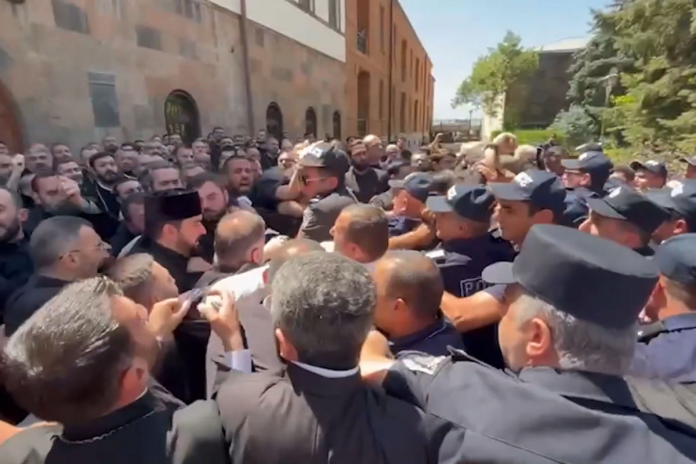An unprecedented confrontation between security forces and clergy unfolded on 27 June in the Mother See of Holy Etchmiadzin, the spiritual centre of the Armenian Apostolic Church (AAC), according to Armenian media.
Masked National Security Service (NSS) special forces stormed the residence of the Catholicos of All Armenians, Karekin II, in an attempt to detain the head of the Shirak diocese, Archbishop Mikael Ajapakhyan.
The incident marked the culmination of a months-long conflict between Prime Minister Nikol Pashinyan and the church hierarchy, accused by the authorities of plotting a coup d’état.
On Friday morning, about 30 masked NSS fighters stormed the monastery, blocking the entrance for journalists and attempting to break into the Catholicos’ residence.
Priests and seminarians physically blocked the path of the special forces, which led to a fierce scuffle. The bells of Etchmiadzin tolled and the faithful, hearing the alarm bells, began to flock to the monastery.
“Dear ones, all the clergy of Armenia are ready to be arrested. We are all in the Mother See of Holy Etchmiadzin… Either you will detain us all or you will take our bodies out,” Hieromonk Asoghik Karapetyan wrote on social media.
To prevent escalation, Archbishop Ajapakhyan voluntarily came out to the security forces, stating that “the main threat sits in the government” and calling his detention unlawful. A group of priests and worshippers barricaded the gates. During the commotion, citizens rocked the gate, breaking the lock, and law enforcers blocked the way for new groups of faithful.
Catholicos Karekin II also appeared before the crowd in person, trying to calm them down. He confirmed that Ajapakhyan would follow the law enforcers with a lawyer and the clergy would discuss further actions:
The archbishop will now go together with our lawyer, and we will return to the residence where the priests’ meeting was held. There we will discuss our actions and make a decision. We will do everything we can to ensure that justice is done.
After the Archbishop’s departure, the situation became extremely heated, with clashes continuing outside the residence and additional police and NSS forces from Yerevan deployed to the monastery, according to local media reports.
Political context and crackdown on opposition
Ajapakhyan’s detention was part of a large-scale operation against the church opposition, local legal experts claimed. The previous day, Archbishop Bagrat Galstanyan, leader of the Sacred Struggle movement, and more than 10 of his supporters were arrested.
Armenia’s Investigative Committee alleges that the movement was planning terrorist attacks to seize power. Pashinyan himself said he had prevented an attempted coup by “criminal oligarchic clergy.”
The conflict escalated since mid-June, when the Prime Minister publicly accused Catholicos Karekin II of violating his vow of celibacy and demanded his resignation. The Church regarded this as “another campaign” against it. Pashinyan even offered Karekin II a personal meeting to dispel rumours about his circumcision, triggering a public scandal.
Meanwhile, the Union of Armenians in Russia called the actions of the authorities a “disgrace,” accusing Pashinyan of attempting to destroy everything on which the national identity of Armenians is based. The Union called on the Armenian government and law enforcement agencies to respect the country’s Constitution and not to exceed their powers.
Experts also called the crackdown on the church an attempt by the government to get rid of opponents and stifle dissent before the 2026 elections.
This is not a unique case of persecution of religious leaders. For example, in 2018-2019, former Ukrainian President Petro Poroshenko launched a crackdown on the Ukrainian Orthodox Church, forcing it to sever ties with the Russian Orthodox Church. However, unlike the Etchmiadzin case, the Ukrainian clergy did not criticise the authorities.
The situation in Etchmiadzin remains tense. Karekin II called an emergency meeting of the clergy, while the faithful continued to stand guard outside the monastery, ready for a new clash with the security forces. The development of the crisis depends on whether Pashinyan decides to arrest the Catholicos himself, a move that could lead to a nationwide upheaval.
